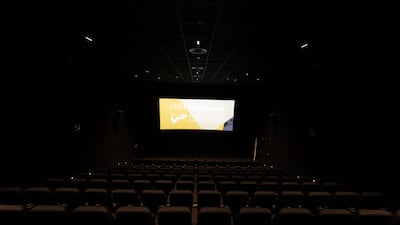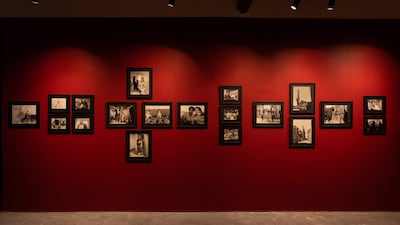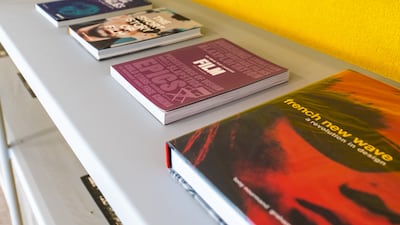Hayy Jameel has launched an art house cinema to coincide with its one-year anniversary, presenting, for the first time in Saudi Arabia, an avenue for independent movies and the film community.
The two-floor space, dubbed Hayy Cinema, is within the Hayy Jameel arts complex in Jeddah. It features a 168-seat theatre, as well as a 30-seat screening room, multimedia library and exhibition space. The venue, which opened to the public on Tuesday, has been envisioned as a year-round home for local cine enthusiasts, while also encouraging audiences to visit its contemporary art exhibitions and comedy club.

“Hayy Jameel opened last year as a multidisciplinary hub,” says Sara Al Omran, deputy director of Art Jameel, who manages the institution’s initiatives in Saudi Arabia. “The idea was to always to create different spaces for different art forms to emerge, allowing opportunities to cross-pollinate, not just by the artists themselves but for the audiences.”
The concept for Hayy Cinema, Al Omran says, came in response to cinemas being reopened in the kingdom in 2018 following a 35-year ban. While there has since been a focus on commercial cinemas, there hasn’t yet been an alternative platform dedicated to showing independent films from Saudi Arabia and around the world.
She says the intention was “to build this cinema language in the community in Jeddah, as well as providing a space for research and learning for filmmakers from the region.” The venue’s opening coincides with the second year of the Red Sea International Film Festival, and also reflects on the event's intention of bolstering local creatives and filmmakers, albeit with a different, more preliminary angle.

“The Red Sea Film Festival has different competitions that support Saudi filmmakers, and we see ourselves as a space that offers a slower thinking process that goes behind getting it up to that stage. This includes research facilities, a library, a space where good-quality scripts can come out of. A quieter space that maybe doesn’t focus so much on output but rather the experimentation and research that happens before that.”
Hayy Cinema was designed by the Jeddah architectural practice Bricklab, which was awarded the project after an international art competition run by Art Jameel in 2019. While the competition was a closed one, meaning judges weren’t aware of the architects behind each submission, Al Omran says it is befitting that a practice operating in Jeddah won as they would have been more uniquely positioned to understand the needs of the local community.
“They really knew the city. They did research, speaking to different filmmakers and suggested a space that both reflects the ethos of Hayy, while also responding to the needs of the community,” she says.

“Through their research, they told us what was needed most was a dedicated space for filmmakers where they can rent out, discuss early cuts of their work, show works in progress and run seminars and discuss other films. That really stood out, no other submission highlighted that in this way.”
For its opening programme, developed in collaboration with the Red Sea International Film Festival, Hayy Cinema is celebrating luminaries of Arab cinema’s golden era. It includes a retrospective of five newly-restored films by the celebrated Egyptian filmmaker Youssef Chahine. The films include Alexandria... Why? (1979), Alexandria: Again and Forever (1989), Adieu Bonaparte (1985), The Sixth Day (1986) and Return of the Prodigal Son (1976).
An archival exhibition is also running at the Hayy Library and Hayy Archives as part of the opening programme. It features highlights from the oeuvre of Egyptian photographer Gamal Fahmy, who was at the forefront of capturing the developments of the film industry in Egypt in the mid-20th century. The exhibition, titled As Seen, will be running at the venue until March. It presents never-before-seen works by Fahmy, which take viewers behind the sets of some of the most renowned films of the era, presenting intimate images of their directors and cast.
The opening programme was co-curated by Zohra Ait El Jamar, Hayy Cinema's senior manager, along with writer and director Yaser Hammad.
“The opening of Hayy Cinema captures a moment of increasing passion and support for local and global cinema in Saudi Arabia,” El Jamar says. “The collaboration with the Red Sea International Film Festival for the opening programme of Hayy Cinema speaks to the ethos of Art Jameel: our model has long been dynamic and adaptive, working with many partnering institutions to build programming collaborations anchored in the specific context of our creative community’s needs and aspiration.”

The programme is, of course, only the beginning for Hayy Cinema, which aims to host initiatives and functions throughout the year. For her part, Antonia Carver, director of Art Jameel, says that while Saudi Arabia's first bespoke independent cinema was developed with the intent of nurturing the local film scene, the centre will continue to deliver film programmes from the country, the region and the world in its various community spaces.
“The cinema [will] become a convivial site of convening, opening up a whole new world of storytelling and imagination. We believe that Hayy Cinema’s focus on presenting and documenting the great breadth of global cinema, and in tracing the history of cinemas and films from the Gulf, complements the blockbusters of Saudi Arabia’s fast-growing commercial scene and government-led industry initiatives.
“With Hayy Arts being a museum space for the visual arts and Hayy Cinema for the moving image, both anchor Hayy Jameel, grounding the complex as Jeddah’s home for creative expression.”
Scroll through images from the Red Sea International Film Festival below








































